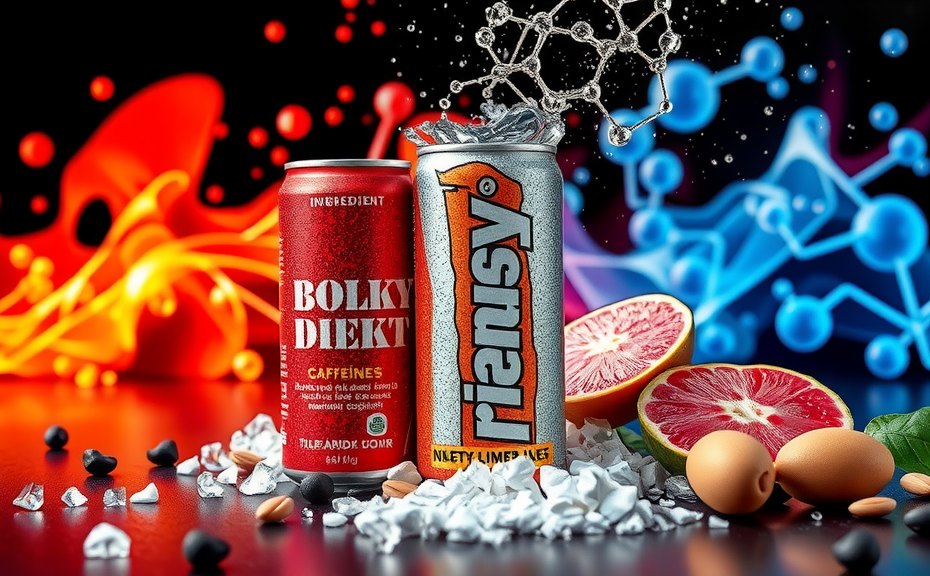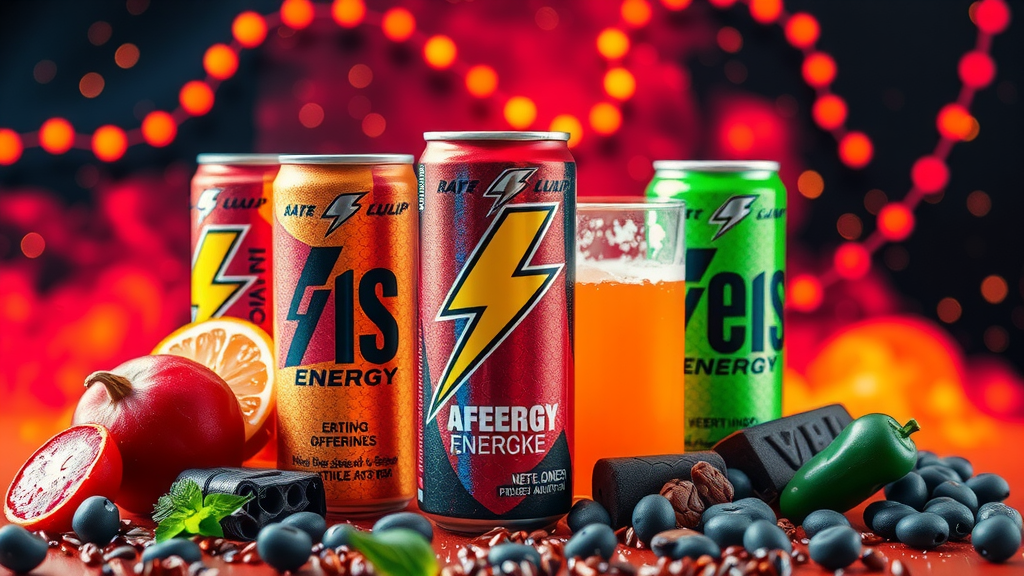The increasing availability of various beverages claiming to boost energy levels has transformed consumer habits. These drinks, often marketed for enhanced performance and alertness, typically include a mix of ingredients like caffeine, taurine, and guarana, creating a unique profile that distinguishes them from traditional refreshments.
Caffeine is widely recognized for its stimulating properties, but the classification of these beverages can be less straightforward.
Many energy drinks combine multiple stimulants, which may amplify their overall impact on the body.
Short-term consumption of energy drinks can lead to increased heart rate and elevated blood pressure, largely attributed to caffeine. The presence of taurine, often included for its potential benefits, may also play a role in how the body responds to these drinks.
Are Energy Drinks Stimulants
Many consumers often overlook the complex profiles of beverages marketed as performance enhancers, especially those claiming to boost alertness. These drinks can significantly impact the central nervous system, leading to heightened energy and clarity.
A standard serving can include caffeine levels that range from a substantial 80 mg to 300 mg, comparable to multiple cups of coffee.
Such doses can lead to improved mental clarity, allowing users to focus better during tasks.
It’s essential to consider the hydration aspect of these drinks, as added electrolytes might be offset by high sugar content, which can diminish overall benefits. Ingredients like guarana, known for its additional caffeine-like effects, can further amplify the stimulation experienced.
While immediate effects may include faster reaction times and improved mental clarity, some users anticipate an energy crash as the stimulant fades. The interaction between caffeine and other components can create unique physiological effects that enhance mental clarity, performance enhancement, hydration, and influence the metabolism of carbohydrates and sugar content.
Understanding Caffeine And Its Effects
The stimulating compound commonly found in energy drinks plays a significant role in enhancing cognitive function and physical performance. This substance functions by blocking adenosine, a neurotransmitter responsible for promoting sleep, thus increasing wakefulness and alertness.
It influences the release of dopamine, a neurotransmitter that can elevate mood and energy levels.
A lesser-known aspect is its effect on metabolic rate, temporarily boosting it and assisting in fat oxidation, which can be particularly beneficial during physical activities.
Excessive intake may lead to a crash in energy, heightened anxiety, or insomnia, especially among individuals with sensitivities. Monitoring personal consumption and understanding tolerance levels is important to mitigate potential health risks associated with this compound.
| Effect | Details |
|---|---|
| Cognitive Enhancement | Blocks adenosine, increasing wakefulness and alertness. |
| Mood Elevation | Influences dopamine release, elevating mood and energy levels. |
| Metabolic Boost | Temporarily increases metabolic rate and assists in fat oxidation. |
| Potential Risks | Excessive intake may lead to energy crashes, anxiety, or insomnia. |
The Role Of Taurine In Energy Drinks
This amino acid contributes significantly to various physiological processes, making it a common additive in many beverages designed to boost physical performance. One of taurine’s important functions is its role in maintaining hydration, which can be crucial during intense workouts where fatigue reduction is a primary concern.
Enhanced stamina is often reported by individuals who include this compound in their routine, particularly when participating in prolonged exercise.
Taurine interacts with neurotransmitters in the brain, which can help support cognitive function and mood stabilization.
These attributes underscore its significance in formulations aimed at providing energy and improving overall performance.
Do Guarana And Ginseng Enhance Energy
Herbal extracts have been utilized for centuries, with many cultures recognizing their potential to impact vitality. Guarana, derived from the seeds of the Paullinia cupana plant, stands out due to its remarkable caffeine concentration, which can be four times higher than that of coffee beans.
This significant caffeine presence plays a vital role in enhancing endurance and alertness among its users.
Ginseng, particularly the American and Asian varieties, is known for its ability to improve focus and diminish fatigue.
Research supports the notion that ginseng can enhance energy metabolism at a cellular level, presenting a unique advantage for athletic performance. Both herbs possess distinctive mechanisms that contribute to energy enhancement, allowing them to emerge as valuable options for those seeking increased vitality.
Transitioning from the role of herbal extracts, it is also important to consider the next factors influencing energy levels. Exploring sugar’s impact on athletic performance, endurance, and concentration through the use of herbal extracts can significantly improve focus.
Herbal Extracts and Energy Enhancement
- Guarana contains caffeine concentrations that can be up to four times higher than coffee beans, enhancing endurance and alertness.
- Ginseng, both American and Asian varieties, is linked to improved focus and reduced fatigue, benefiting athletic performance.
- Research indicates that ginseng can boost energy metabolism at the cellular level, providing a unique advantage for athletes.
- Both guarana and ginseng offer distinct mechanisms for energy enhancement, making them valuable for those seeking increased vitality.
Exploring Sugar Content And Jitteriness
Consumption of high levels of sweeteners can lead to a variety of physical responses, including sensations often interpreted as energy surges. Jitteriness, which manifests as nervousness and restlessness, typically occurs alongside spikes in blood sugar.
When one consumes sugar, there is a quick increase in blood sugar levels, prompting the release of adrenaline.
This heightened level of adrenaline can elevate heart rate and contribute to feelings of mental fatigue as sugar levels eventually decline.
Research has shown that these rapid fluctuations in blood sugar may also play a role in developing anxiety-like symptoms, which can intensify experiences of jitteriness.
Insulin’s effect on the body following increased sugar intake can lead to notable mood enhancement. When insulin is secreted in response to elevated blood sugar, it often results in a subsequent decrease, leading to fatigue and irritability. Individuals may find that engaging in physical activity leads to mood enhancement, increases adrenaline, stabilizes blood sugar, elevates heart rate, and reduces mental fatigue.
Hydration And Electrolytes In Energy Drinks
Optimal performance during physical activities relies heavily on maintaining hydration and electrolyte balance. Water plays a pivotal role in supporting various bodily functions, while sleep deprivation can exacerbate the effects of dehydration, reducing endurance and increasing fatigue.
Unique Fact: The human body can lose up to 2% of its water content during exercise, which can markedly influence performance outcomes.
Electrolytes such as sodium and potassium are integral for muscle function and hydration support.
Unique Fact: They play significant roles in regulating fluid balance and nerve signaling, which is especially important during intense workouts where workout recovery may be necessary. Energy drinks frequently include these electrolytes to enhance recovery. Some energy drinks may provide up to 1,000 mg of electrolytes per serving, effectively optimizing hydration levels during sleep deprivation, workout recovery, and enhancing productivity through a balance of natural stimulants and synthetic ingredients.
Health Risks Of Energy Drink Consumption
The rising trend of energy beverages among young adults and athletes raises numerous safety concerns that are often overlooked. These drinks can significantly impact health, particularly regarding heart health.
For instance, the high caffeine content may lead to an increased heart rate and elevated blood pressure, creating an array of potential health risks for consumers.
Ingredients such as taurine, frequently included for their stimulating effects, can also contribute to irregular heart rhythms, further complicating matters.
Regular consumption often leads to withdrawal symptoms, with users reporting severe headaches and fatigue when attempting to cut back. Exploring these dimensions is beneficial for making informed choices about energy drink consumption, especially as individuals transition from discussing hydration and electrolytes in energy drinks to effective ways to manage fatigue and focus.
Effective Ways To Manage Fatigue And Focus
Fatigue can be a major obstacle to accomplishing daily tasks and maintaining overall health. To counteract this issue, establishing a regular sleep schedule is fundamental; research shows that 20% of adults experience chronic fatigue linked to inconsistent sleep patterns.
Nutritional choices significantly influence energy levels, and a diet abundant in whole foods, particularly low-sugar options and high-fiber items, can sustain energy throughout the day.
For those needing an immediate pick-me-up, energy supplements featuring B vitamins can offer a quick solution.
Regular physical activity, even in short bursts, helps enhance focus while alleviating tiredness.
Hydration also plays a pivotal role; even mild dehydration, as little as 2%, can negatively affect cognitive performance and heighten feelings of fatigue. Incorporating mindfulness techniques can further reduce fatigue by fostering greater concentration and effective stress management. It is important to consider various options such as energy supplements, herbal remedies, performance drinks, recovery drinks, and sugar-free options when optimizing your health and performance.
Fatigue Management
- 20% of adults experience chronic fatigue due to inconsistent sleep patterns.
- A diet rich in whole foods, low in sugar, and high in fiber can help maintain energy levels.
- Mild dehydration (as little as 2%) can impair cognitive performance and increase fatigue.
- Incorporating mindfulness techniques can improve concentration and reduce feelings of fatigue.

